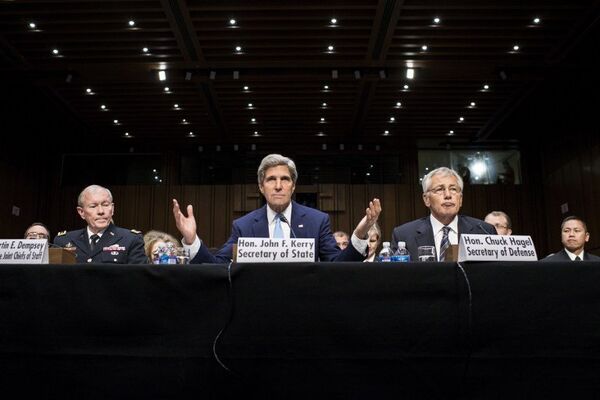WASHINGTON, September 3 (RIA Novosti) – The White House amplified its argument Tuesday for a military strike on Syria, assuring a congressional panel that it had detailed “physical evidence” that chemical weapons were used by government forces and warning failure to act would have dire consequences.
But in an hours-long appearance before the Senate Foreign Relations Committee, President Barack Obama’s top lieutenants on security and diplomacy faced aggressive questioning and struggled at times to explain overall US strategy on Syria and how the plan for a “limited” strike would fit into that picture.
Leading a trio of top Obama cabinet officials, Secretary of State John Kerry said the White House was certain “beyond any reasonable doubt” that the forces loyal to Syrian President Bashar Assad carried out chemical weapons attacks in the Damascus suburbs on Aug. 21.
“We have physical evidence of where the rockets came from and when,” Kerry said. “Not one rocket landed in regime-controlled territory.”
He repeated assertions made Sunday that testing of hair and blood samples from victims of the attacks in question had tested positive for “signatures of sarin” gas allegedly used. And he reiterated assurances that Obama had no intention of deploying any US troops into Syria itself.
“This is about the world’s ‘red line,’ about humanity’s ‘red line,’” Kerry said, rejecting charges from critics that the White House was seeking approval from Congress for a military strike in Syria in order to make good on Obama’s own discussion a year ago about how chemical arms would cross a “red line.”
However, when pressed early in the hearing about Obama’s promise not to place US “boots on the ground” in Syria, Kerry seemed to suggest this could not be completely ruled out, saying “I don’t want to take off the table an option that might or might not be available to the president to secure our country.”
He later reiterated several times that the authorization for military action against Syria that Obama was seeking from Congress precluded any troop deployment and said the White House would be prepared to accept wording to a draft resolution making that entirely clear.
Kerry’s testimony was at one point interrupted by a protester who managed to enter the chamber where the committee hearing took place and who shouted “We don’t want another war!” and “The American people do not want this!” before being removed from the room by police.
Kerry was accompanied before the panel by Defense Secretary Chuck Hagel and Gen. Martin Dempsey, the chairman of the US joint chiefs of staff.
Reminded that both he and Dempsey had only last spring spoken out against any military intervention in Syria, Hagel said the situation on the ground had changed and now required some kind of strike.
“We are dealing with a new set of realities based on facts,” Hagel said. “This is about getting to an endgame. That endgame is a diplomatic settlement.”
Asked why Obama was calling for a limited military strike against Syria but did not want to take more robust action in line with his administration’s position that Assad cannot be included in any post-conflict political arrangement for Syria, Kerry and Hagel admitted the situation was “complicated.”
Obama “is not asking the Congress for authorization to become whole hog involved in Syria’s civil war,” Kerry said. “But, there is a separate track … which is that Assad must go, that he has lost all” authority to lead Syria.
Hagel echoed that notion, saying Obama now wanted Congress to approve “very specific and focused military action” but adding that “the goal of removing Assad from office is still the policy of the administration.”
When Kerry at one point said experts in the region near Syria believed that if he were overthrown there could be a “fairly rapid transition” to a new government for the country, Sen. Ron Johnson retorted: “That tends to argue for a more robust response” than the White House says it is planning.


